Abstract
This study examines the work ethic characteristics of Protestant, Catholic, and Muslim people who are living in the US. People originally from Turkey were targeted under the Muslim group. Since a significant number of people selected “none” as their religious affiliation in the survey, this group has also been included in the final analysis. Eight hundred and three people (313 Protestants, 180 “none”, 96 Muslims, 86 Catholics, and 128 other) participated in this questionnaire study. The analyses revealed that Muslim Turks reported greater scores on four of the five Protestant work ethic (PWE) characteristics. Protestants scored higher than Catholics on all characteristics, but there was no significant difference.


Similar content being viewed by others
Abbreviations
- ANOVA:
-
Univariate Analysis of Variance
- IRB:
-
Institutional Review Board
- MANOVA:
-
Multivariate Analysis of Variance
- PWE:
-
Protestant Work Ethic
- UNC-CH:
-
University of North Carolina at Chapel Hill
References
Arslan, M. (2000). A Weberian approach to Turkish entrepreneurship. Hacettepe University, Iktisadi ve Idari Bilimler Dergisi, 18(2), 377–391.
Arslan, M. (2001). The work ethic values of Protestant British, Catholic Irish and Muslim Turkish managers. Journal of Business Ethics, 31, 321–339.
Arslan, M., & Chapman, M. (2001). Work ethic values of practicing Catholic Irish and Protestant British managers. Irish Journal of Management, 22(2), 83–104.
Arslan, M. (2003). Türkiye’de İslam ve Çalışma Ahlakı Değerleri [Islam and work ethic values in Turkey]. Değerler Eğitimi Derğisi [Journal of Values Training], 1, off-print.
Blau, G., & Ryan, J. (1997). On measuring work ethic: A neglected work commitment facet. Journal of Vocational Behavior, 51, 435–448.
Chusmir, L. H., & Koberg, C. S. (1988). Religion and attitudes toward work: A new look at an old question. Journal of Organizational Behavior, 9(3), 251–262.
Clarke, O. (1983). The work ethic: An international perspective. In J. Barbash, et al. (Eds.), The work ethic—a critical analysis. Madison, WI: Industrial Relations Research Association Series.
Ernst, C. W. (2003). Following Muhammad: Rethinking Islam in the contemporary world. Chapel Hill, NC: The University of North Carolina Press.
Furnham, A. (1990a). A content, correlation, and factor analytic study of seven questionnaire measures of the Protestant work ethic. Human Relations, 43(4), 383–399.
Furnham, A. (1990b). The protestant work ethic: The psychology of work related beliefs and behaviors. New York: Routledge.
Furnham, A. (1991). The Protestant work ethic in Barbados. Journal of Social Psychology, 131(1), 29–43.
Furnham, A., & Muhiudeen, C. (1984). The Protestant work ethic in Britain and Malaysia. The Journal of Social Psychology, 122, 157–161.
Furnham, A., & Rajamanickam, R. (1992). The Protestant work ethic and just world beliefs in Great Britain and India. International Journal of Psychology, 27(6), 401–416.
Furnham, A., et al. (1993). A comparison of Protestant work ethic beliefs in thirteen nations. The Journal of Social Psychology, 133(2), 185–197.
George, D., & Mallery, P. (2003). SPSS for windows step by step: A simple guide and reference. Boston: Pearson Education, Inc.
Hair, J. F., et al. (1995). Multivariate data analysis: With readings. Englewood Cliffs, NJ: Prentice Hall.
Huntington, S. P. (2004). Who are we? The challenges to America’s national identity. New York: Simon & Schuster.
Jones, H. B. (1997). The Protestant ethics: Weber’s model and the empirical literature. Human Relations, 50(7), 757–778.
Martella, R. C., et al. (1999). Research methods: Learning to become a critical research consumer. Boston: Allyn and Bacon.
Mirels, H. L. & Garrett, J. B. (1971). The Protestant ethic as a personality variable. Journal of Consulting and Clinical Psychology, 36(1), 40–44.
Nasr, S. H. (1985). Islamic work ethics. In J. Pelikan, J. Kitagawa & S. H. Nasr (Eds.), Comparative work ethics: Judeo-Christian, İslamic, and Eastern. (pp. 49–62). Washington, DC: Library of Congress, Occasional Papers of the Council of Scholars, No. 4.
Nasr, S. H. (1994). Traditional Islam in the modern world. New York: Kegan Paul International.
Niles, F. S. (1994). The work ethic in Australia and Sri Lanka. The Journal of Social Psychology, 134(1), 55–59.
Niles, F. S. (1999). Toward a cross-cultural understanding of work-related beliefs. Human Relations, 52(7), 855–867.
Rose, M. (1985). Re-working the work ethic: Economic values and socio-cultural politics. London: Batsford Academic and Educational.
Sieber, J. E. (1992). Planning ethically responsible research: A guide for students and internal review boards (Vol. 31). Applied Social Research Methods Series, Newbury Park, California: Sage Publications.
Şimşek, Z., Veiga, J. F., & Lubatkin, M. H. (2005). Challenges and guidelines for conducting internet-based surveys in strategic management research. In D. J. Ketchen & D. D. Bergh (Eds.), Research methodology in strategy management. (Vol. 2, pp. 179–196). Amsterdam: Elsevier.
Tang, T. L. (1993). A factor analytic study of the Protestant work ethic. The Journal of Social Psychology, 133(1), 109–111.
Vogt, W. P. (2007). Quantitative research methods for professionals. Boston: Pearson Education, Inc.
Weber, M. (1991). From Max Weber: Essays in sociology (H. H. Gerth & C. W. Mills, Eds. & Trans.). London: Routledge.
Weber, M. (2002). The Protestant ethic and the “spirit” of capitalism and other writings (P. Baehr & G. C. Wells, Eds. & Trans.). New York: Penguin Books.
Wollack, S., Goodale, J. G., Wijting, J. P., & Smith, P. C. (1971). Development of the survey of work values. Journal of Applied Psychology, 55(4), 331–338.
2009 National Business Ethics Survey: Ethic in the Recession, Ethics Resource Center, http://www.ethics.org on 11/21/2010.
Author information
Authors and Affiliations
Corresponding author
Rights and permissions
About this article
Cite this article
Zulfikar, Y.F. Do Muslims Believe More in Protestant Work Ethic than Christians? Comparison of People with Different Religious Background Living in the US. J Bus Ethics 105, 489–502 (2012). https://doi.org/10.1007/s10551-011-0981-z
Received:
Accepted:
Published:
Issue Date:
DOI: https://doi.org/10.1007/s10551-011-0981-z




